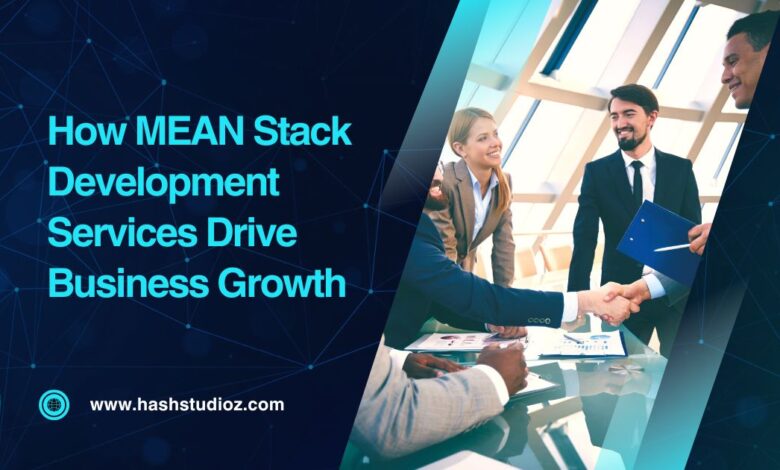How MEAN Stack Development Services Drive Business Growth in 2024

Businesses are constantly looking for methods to improve their digital presence and optimize their operations in the rapidly changing realm of technology. Robust online and mobile applications are among the best ways to accomplish this. MongoDB, Express.js, Angular, and Node.js development services, together known as MEAN stack development services, have become potent tools for building scalable and dynamic applications. This article examines the ways in which MEAN stack development services are propelling corporate expansion in 2024, stressing their benefits, uses, and prospects for growth.
Understanding MEAN Stack Development
What is MEAN Stack?
The MEAN stack is a collection of JavaScript-based technologies used to develop web applications. The acronym stands for:
- MongoDB: A NoSQL database that stores data in JSON-like documents.
- Express.js: A web application framework for Node.js, providing a robust set of features for web and mobile applications.
- Angular: A front-end web application framework developed by Google, used to create dynamic single-page applications (SPAs).
- Node.js: A JavaScript runtime built on Chrome’s V8 JavaScript engine, enabling server-side scripting.
Why Choose MEAN Stack?
MEAN stack development offers several advantages:
- Full-Stack JavaScript: With MEAN, developers can use JavaScript for both client-side and server-side development, ensuring a seamless integration and reducing context-switching between languages.
- Open-Source and Community Support: Each component of the MEAN stack is open-source, backed by a strong community, ensuring continuous improvements and support.
- Scalability and Performance: The combination of MongoDB’s scalability, Node.js’s non-blocking architecture, and Angular’s efficient rendering makes MEAN stack applications highly performant and scalable.
Key Benefits of MEAN Stack Development Services
1. Enhanced Performance and Speed
Non-Blocking Architecture of Node.js
Node.js operates on a non-blocking, event-driven architecture, which allows multiple operations to be executed simultaneously without waiting for previous tasks to complete. This leads to faster processing times and enhanced performance, making MEAN stack applications highly efficient.
Efficient Data Handling with MongoDB
MongoDB, as a NoSQL database, handles large volumes of data effortlessly. Its schema-less nature allows for flexibility in data modeling, ensuring quick data retrieval and storage, which contributes to the overall speed of the application.
2. Cost-Effective Development
Open-Source Technologies
All components of the MEAN stack are open-source, reducing the need for costly licenses. This makes it an attractive option for startups and small to medium-sized enterprises (SMEs) looking to develop robust applications on a budget.
Reusability of Code
Using JavaScript across the entire stack promotes code reusability, which accelerates the development process and reduces the time and effort required to build applications, leading to cost savings.
3. Scalability and Flexibility
Modular Architecture
The modular architecture of MEAN stack components allows developers to scale applications effortlessly. MongoDB’s horizontal scalability ensures that the database can handle increased loads by distributing data across multiple servers.
Flexible Deployment
MEAN stack applications can be deployed across various platforms, including cloud environments, providing businesses with the flexibility to scale resources as needed.
4. High-Quality User Experience
Dynamic Front-End with Angular
Angular’s two-way data binding and component-based architecture enable the creation of highly interactive and dynamic user interfaces. This leads to a superior user experience, which is crucial for retaining customers and driving engagement.
Real-Time Applications
The combination of Node.js and MongoDB allows for the development of real-time applications, such as chat applications and live collaboration tools, enhancing user interaction and satisfaction.
5. Streamlined Development Process
Unified Language Environment
With JavaScript being the common language for both front-end and back-end development, the MEAN stack simplifies the development process. This leads to improved collaboration among developers and a more streamlined workflow.
Rapid Prototyping
MEAN stack’s robust frameworks and libraries facilitate rapid prototyping, allowing businesses to quickly validate ideas and bring products to market faster.
Applications of MEAN Stack Development
E-Commerce Platforms
MEAN stack is ideal for developing scalable and high-performance e-commerce platforms. Its ability to handle large volumes of data, coupled with dynamic user interfaces, ensures a seamless shopping experience for users.
Content Management Systems (CMS)
The flexibility and scalability of MEAN stack make it a perfect choice for building content management systems. MongoDB’s document-based structure allows for efficient content storage and retrieval, while Angular provides an intuitive user interface for content management.
Real-Time Applications
Applications requiring real-time data processing and interaction, such as live chat applications, collaborative tools, and social media platforms, benefit greatly from MEAN stack development. The non-blocking nature of Node.js and the real-time capabilities of MongoDB contribute to the responsiveness of these applications.
Enterprise Applications
Large-scale enterprise applications require robust, scalable, and maintainable solutions. MEAN stack’s modular architecture and unified development environment make it a suitable choice for developing complex enterprise applications that can grow with the business.
Future Potential of MEAN Stack Development
Integration with Emerging Technologies
Artificial Intelligence and Machine Learning
Integrating AI and machine learning capabilities into MEAN stack applications can provide businesses with advanced analytics, personalized user experiences, and automation. MongoDB’s flexible data model and Node.js’s performance make it feasible to implement AI-driven features seamlessly.
Internet of Things (IoT)
The MEAN stack can be leveraged to develop IoT applications, where real-time data processing and scalability are crucial. Node.js’s event-driven architecture is particularly well-suited for handling the constant data streams generated by IoT devices.
Enhanced Security Features
As cybersecurity becomes a top priority for businesses, MEAN stack development is evolving to incorporate advanced security features. This includes enhanced authentication mechanisms, data encryption, and secure communication protocols, ensuring that applications are resilient against cyber threats.
Progressive Web Applications (PWAs)
MEAN stack’s capability to develop dynamic and responsive web applications aligns well with the growing trend of Progressive Web Applications. PWAs offer the benefits of both web and mobile applications, providing users with a seamless experience across devices.
Success Stories with MEAN Stack
1: E-Commerce Giant
An e-commerce giant adopted the MEAN stack to revamp its platform, resulting in a 40% increase in site performance and a 30% reduction in development time. The scalability of MongoDB allowed the platform to handle peak traffic during sales events, ensuring a smooth shopping experience for millions of users.
2: Real-Time Collaboration Tool
A leading provider of real-time collaboration tools used the MEAN stack to develop a new feature-rich platform. The non-blocking nature of Node.js and the real-time capabilities of MongoDB enabled seamless collaboration, leading to a 50% increase in user engagement and a significant boost in productivity.
3: Enterprise Resource Planning (ERP) System
A large enterprise implemented a MEAN stack-based ERP system to streamline its operations. The modular architecture allowed for easy integration with existing systems, while Angular provided a user-friendly interface. The result was a 25% increase in operational efficiency and a substantial reduction in operational costs.
Conclusion
In 2024, MEAN stack development services are proving to be a driving force behind business growth. The stack’s ability to deliver high-performance, scalable, and cost-effective solutions makes it an attractive choice for businesses across various industries. By leveraging the power of MEAN stack, businesses can develop dynamic applications that enhance user experience, streamline operations, and drive engagement.
The future potential of MEAN stack development is immense, with possibilities for integration with emerging technologies, enhanced security features, and the development of Progressive Web Applications. As businesses continue to seek innovative solutions to stay competitive, MEAN stack development will undoubtedly play a crucial role in shaping the digital landscape.
Investing in MEAN stack development services not only positions businesses for growth but also ensures they remain at the forefront of technological advancements, ready to adapt to the ever-changing demands of the market.



